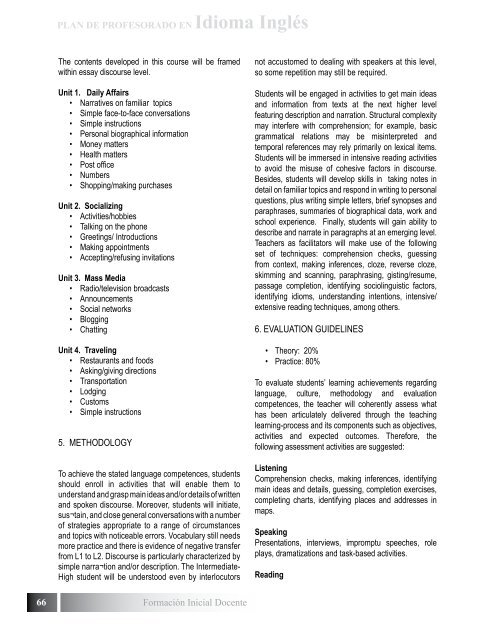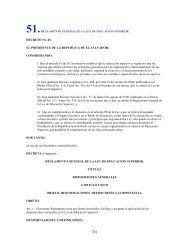Idioma Inglés
You also want an ePaper? Increase the reach of your titles
YUMPU automatically turns print PDFs into web optimized ePapers that Google loves.
PLAN DE PROFESORADO EN <strong>Idioma</strong> <strong>Inglés</strong><br />
The contents developed in this course will be framed<br />
within essay discourse level.<br />
Unit 1. Daily Affairs<br />
• Narratives on familiar topics<br />
• Simple face-to-face conversations<br />
• Simple instructions<br />
• Personal biographical information<br />
• Money matters<br />
• Health matters<br />
• Post office<br />
• Numbers<br />
• Shopping/making purchases<br />
Unit 2. Socializing<br />
• Activities/hobbies<br />
• Talking on the phone<br />
• Greetings/ Introductions<br />
• Making appointments<br />
• Accepting/refusing invitations<br />
Unit 3. Mass Media<br />
• Radio/television broadcasts<br />
• Announcements<br />
• Social networks<br />
• Blogging<br />
• Chatting<br />
Unit 4. Traveling<br />
• Restaurants and foods<br />
• Asking/giving directions<br />
• Transportation<br />
• Lodging<br />
• Customs<br />
• Simple instructions<br />
5. Methodology<br />
To achieve the stated language competences, students<br />
should enroll in activities that will enable them to<br />
understand and grasp main ideas and/or details of written<br />
and spoken discourse. Moreover, students will initiate,<br />
sus¬tain, and close general conversations with a number<br />
of strategies appropriate to a range of circumstances<br />
and topics with noticeable errors. Vocabulary still needs<br />
more practice and there is evidence of negative transfer<br />
from L1 to L2. Discourse is particularly characterized by<br />
simple narra¬tion and/or description. The Intermediate-<br />
High student will be understood even by interlocutors<br />
not accustomed to dealing with speakers at this level,<br />
so some repetition may still be required.<br />
Students will be engaged in activities to get main ideas<br />
and information from texts at the next higher level<br />
featuring description and narration. Structural complexity<br />
may interfere with comprehension; for example, basic<br />
grammatical relations may be misinterpreted and<br />
temporal references may rely primarily on lexical items.<br />
Students will be immersed in intensive reading activities<br />
to avoid the misuse of cohesive factors in discourse.<br />
Besides, students will develop skills in taking notes in<br />
detail on familiar topics and respond in writing to personal<br />
questions, plus writing simple letters, brief synopses and<br />
paraphrases, summaries of biographical data, work and<br />
school experience. Finally, students will gain ability to<br />
describe and narrate in paragraphs at an emerging level.<br />
Teachers as facilitators will make use of the following<br />
set of techniques: comprehension checks, guessing<br />
from context, making inferences, cloze, reverse cloze,<br />
skimming and scanning, paraphrasing, gisting/resume,<br />
passage completion, identifying sociolinguistic factors,<br />
identifying idioms, understanding intentions, intensive/<br />
extensive reading techniques, among others.<br />
6. Evaluation guidelines<br />
• Theory: 20%<br />
• Practice: 80%<br />
To evaluate students’ learning achievements regarding<br />
language, culture, methodology and evaluation<br />
competences, the teacher will coherently assess what<br />
has been articulately delivered through the teaching<br />
learning-process and its components such as objectives,<br />
activities and expected outcomes. Therefore, the<br />
following assessment activities are suggested:<br />
Listening<br />
Comprehension checks, making inferences, identifying<br />
main ideas and details, guessing, completion exercises,<br />
completing charts, identifying places and addresses in<br />
maps.<br />
Speaking<br />
Presentations, interviews, impromptu speeches, role<br />
plays, dramatizations and task-based activities.<br />
Reading<br />
66 Formación Inicial Docente






